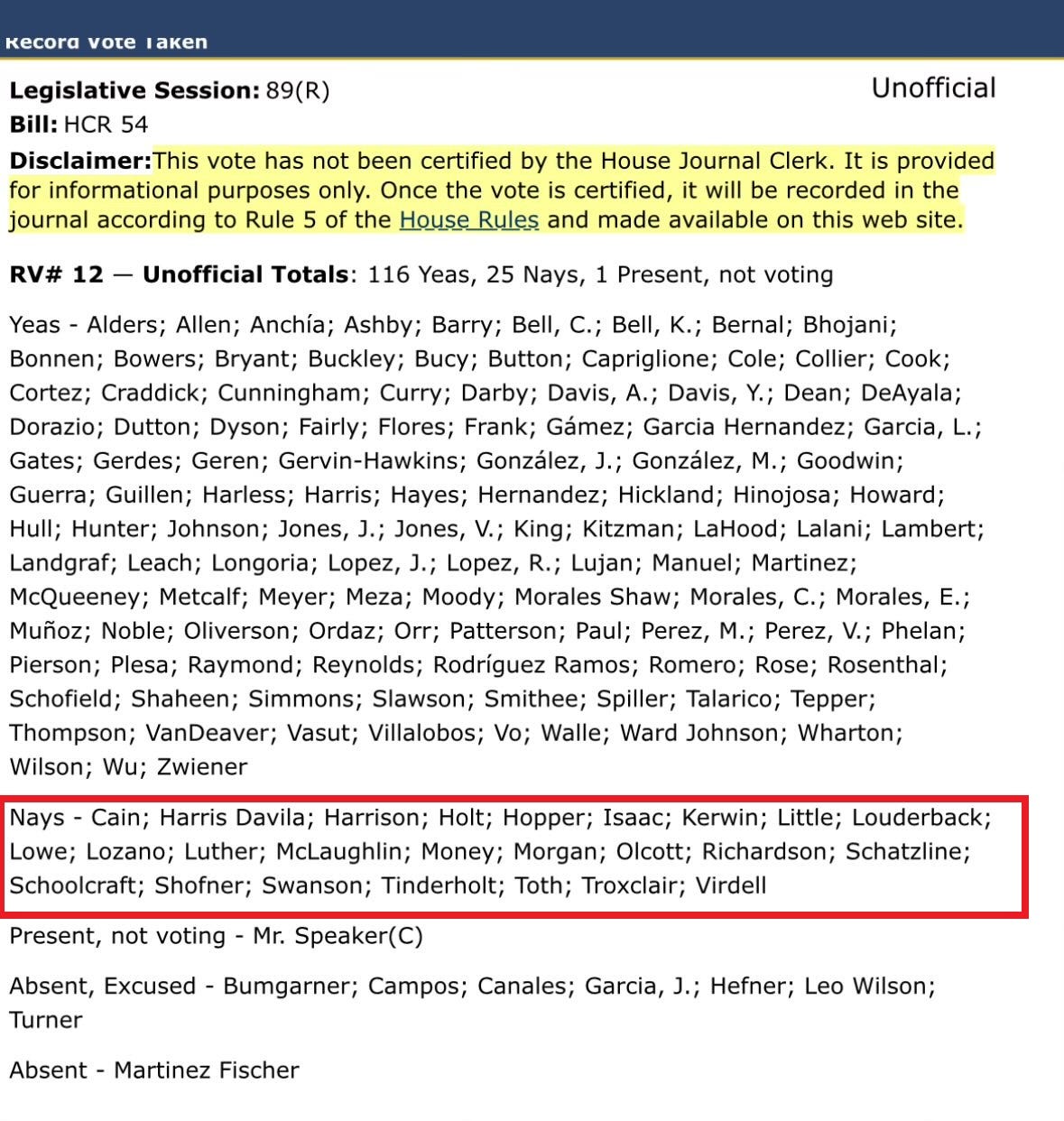Day 13: Texas Budget Hearings Reveal A Justice System On Life Support
How underfunding and mismanagement are failing Texans across the board.
Yesterday was Day 13 in the Texas Legislature and the first day of the Senate Committee’s three-week sprint on the budget. Today, a lot is happening in Austin. Most activists are laser-focused on the Senate Committee on Education, which will be discussing the voucher scheme. I expect the testimony in that committee to go well into the evening. I’ll have a full run-down of today’s events tomorrow morning.
You can find the live stream here if you want to watch it live with me.
Day 13 - Texas House.
Today was supposed to be a mostly uneventful day in the House, but as you remember, the Dunn militia declared war on their Republican peers over the House rules last week. The House was supposed to gavel in, read a resolution or two, then adjourn until tomorrow. But the far right found it an excellent opportunity to bang on their chests.
The clip is only six minutes long:
First, Steve Toth (R-HD15) appeared at the back mic for questions. His first question was whether he wanted to know if the initials at the bottom of the rules, “HLB,” referred to Hugh Brady.
Hugh Brady has been a parliamentarian in the Texas House since 2019. Parliamentarians are the House’s chief legal advisers on constitutional and legislative procedure, practice, and privilege. They also serve as legal advisers to the Speaker, members, committees, officers, and employees in their official capacities.
In the last session, the Dunn crew got their panties all in a wad when Brady advised Speaker Phelan to sustain the Democrats’ Points of Order. Points of Order are called on any legislation that breaks House rules. Tim Dunn funded the right-wing media outlet, the Texas Scorecard, that attacked Parlementatian Hugh Brady after that, claiming that Brady didn’t go along with their rule-breaking because he was a Democrat.
Their proof? Hugh Brady served as general counsel for the White House Office of Administration under President Obama from 2014 to 2017. The far-right has been pushing for Brady’s replacement with a loyalist who would side with them, even if it broke the rules.
This is textbook fascism. The attack on Hugh Brady, a nonpartisan legal expert whose job is to enforce the rules as written, isn’t just about one man. It’s about dismantling any neutral authority that might slow down their power grab.
Toth said to Speaker Burrows, “But you said last week that Hugh Brady wouldn’t be the parliamentarian anymore,” putting Burrows in a precarious position.
Burrows eventually said, “No permanent officers have been appointed yet for this session.”
Schatzline is shooting for an Oscar.
There are so many flamboyant Republicans this session that if they were competing for the most theatrical performance, Nate Schatzline (R-HD93) might be the front-runner.
Schatzline said to Burrows, with exceptional vigor, “I’m asking if you plan to honor the motion to call the previous question consistently, regardless of who the 25 signatures are, or was that just to kill our conservative reforms in the rules package?”
The look on Burrows’ face was pure annoyance.
Next, Mike Olcott (R-HD63) was at the mic inquiring if the House would take HR3, the Housekeeping resolution. They aren’t. The Temper Tantrum Team didn’t like that at all. They were waiting for the Housekeeping resolution to attempt to strip more power away from Democrats.
The far right is framing the Burrows as skipping over the resolution to another betrayal and his alliance with the Democrats. This is where the GOP civil war is. They have not heard any legislation or even get committee assignments, but they are rabid and itching for a fight.
Last, they sent up Shelley Luther (R-HD62). Bless her heart. They wrote down what she needed to say, but she struggled. Only about 10% of stroke victims ever make a full recovery. However, Luther seems to be doing well, considering.
The House will meet tomorrow and Wednesday but adjourn until the following Tuesday. Burrows told members to have their preference cards by the end of business today. Preference cards indicate which committee assignments a member prefers. We should expect to see the House committee assignments this week.
When the members voted on whether or not to have a five-day weekend, the far right voted against it, we should expect to see this group mostly vote in unison for the entire session. The members of the red box are our problem children:
Day 13 - Senate Finance Committee, Budget Hearings - Day One.
The Senate Committee on Finance began hearing on the state budget. Some of these hearings can be a real snooze-fest, but if you listen hard enough, you’ll find out many shocking things about how our government is run. We’ll get into that, but first, let’s talk about Comptroller Glenn Hagar’s (R) testimony on the budget.
Key points:
Texas has $94.6 billion available for general spending.
$115 billion from the federal government.
$362 billion total revenue projected for 2026-2027.
Sales tax revenue growth is slowing but still dominates tax collections.
Oil and gas tax revenues remain strong, but ESF deposits will be capped.
Budget caution is urged due to slowing economic growth and inflation.
Long-term infrastructure investments are needed despite budget surpluses.
Automatic property tax relief will continue growing, limiting flexibility.
After Hagar’s testimony, the committee heard from Supreme Court Justice Jimmy Blacklock (R). The lengthy (40-minute) testimony shed light on how Texas judges are paid starvation wages.
Blacklock told the committee that Texas judges are severely underpaid, making attracting and retaining qualified individuals challenging. After 40 years of service, a first-year lawyer at a private law firm makes more than the Texas Supreme Court Chief Justice. Texas ranks 49th out of 50 states in pay for district judges.
How does the Texas government breed corruption? It does it by giving people essential jobs, like judges, and then paying them starvation wages. What about ethics? We’ll get to that (it’s bad).
Many district judges are leaving the bench because their salaries do not keep up with the cost of living. Texas is losing highly qualified candidates to the private sector and other government legal positions that offer better pay.
Judges handle billions of dollars in legal disputes affecting families, businesses, and constitutional rights across Texas. They do so on salaries that are often less than the cost of living.
During the hearing, Huffman said she filed a bill to increase judicial salaries by 15%, but Blacklock suggested Texas needs to do even more just to be competitive nationally.
The Republican-led government in Texas intentionally underpays judges to an extent that fosters corruption. Luckily, the Commission on Judicial Conduct keeps them in check. They testified yesterday, too.
The most shocking part of their testimony was when she said they shut down the online portal where people could complain because they were getting too many and wanted to cut down on their workload. Seriously.
The Texas Commission on Judicial Conduct is understaffed, overloaded, facing budget shortfalls, and using outdated technology. It cannot find staff. One example the testifier mentioned was how it couldn’t fill an open attorney position because it was only offering a salary of $81,000.
That wasn’t even the most shocking testimony of the day.
How underfunding government programs is leading to people in poverty getting screwed.
As part of the judiciary budget, the Texas Indigent Defense Commission (TIDC) also testified yesterday about its shortfall and needs. The baseline budget is $9.7 million less than the current appropriation due to a $10 million annual shortfall in General Revenue-Devoted (GRD) funds.
There is a massive rural attorney shortage. Since 2014, the number of rural attorneys taking indigent defense cases has declined by 27%. Rural public defender offices are underfunded, forcing indigent defendants in small counties to rely on overworked or inexperienced private attorneys. Counties with no tax base to support public defenders cannot guarantee representation.
These funding shortfalls lead to longer jail stays and worse case outcomes.
The state also isn’t funding CPS cases. Counties spent $62.7 million on legal representation for CPS cases in 2023, but the state spent $0. Children and parents involved in CPS cases lack adequate legal representation, increasing the risk of wrongful family separations.
But the icing on the cake? TIDC spends 100% of its state funds on Operation Lone Star (OLS) cases, covering only border-related offenses. Thus, the rest of Texas lacks sufficient legal aid for indigent defense. (90% of arrests under Operation Lone Star have been for misdemeanor trespassing.)
If TIDC cannot fund public defenders, counties must pay for court-appointed lawyers, burdening local taxpayers. Rural counties with no public defender offices struggle to provide adequate defense, leading to delays, wrongful convictions, and longer pretrial detentions.
Texas has a $200 million indigent defense funding gap. (But $6.5 billion is set to go to Operation Lone Star.)
The Texas Law Library also testified yesterday and gave a similar report about how the underfunding of their agency is leaving low-income Texans suffering.
Texas has a legal information crisis, particularly in rural areas. Many poor and rural Texans are forced to represent themselves without legal guidance. The State Law Library is the sole resource for numerous Texans who cannot afford lawyers. The library staff is overwhelmed and unable to provide timely legal information. Additionally, Spanish-speaking Texans lack legal resources available in their language. Without more funding, low-income Texans will continue to lose legal battles simply because they can’t afford help.
From underfunded judicial agencies to the dire state of indigent defense and legal resources, yesterday’s budget hearings painted a picture of a system failing Texas’ most vulnerable citizens.
While the state boasts a massive surplus, critical programs barely make ends meet, leaving low-income Texans, rural communities, and even judges struggling to stay afloat.
The government’s willingness to funnel billions into political stunts like Operation Lone Star while neglecting essential legal services and judicial integrity reveals a disturbing imbalance. The result? Longer jail stays, wrongful family separations, overburdened courts, and a public left in the dark without access to the legal help they need.
Texans deserve a government that prioritizes people over politics, fairness over theatrics, and a justice system that works for everyone, not just those who can afford it.
January 31: Left In Texas Podcast - Representative Christina Morales
February 2: Senate Finance Committee - Article III (Education and voucher scheme funding)
March 14: The last day Legislators can file bills.
June 2: The 89th Legislative Session ends.
Click here to find out what Legislative districts you’re in.
LoneStarLeft is a reader-supported publication. To receive new posts and support my work, consider becoming a free or paid subscriber.
Follow me on Facebook, TikTok, Threads, YouTube, and Instagram.






great discussion of Texas "priorities". great journalism